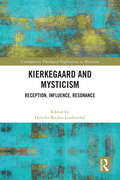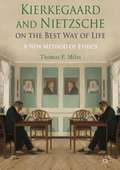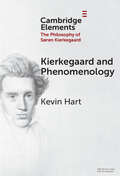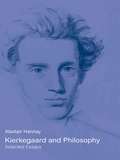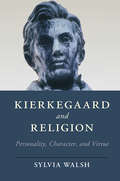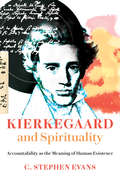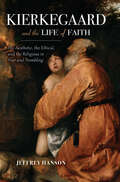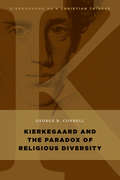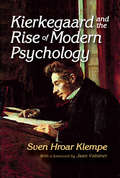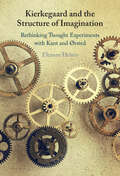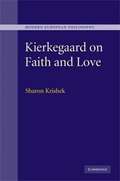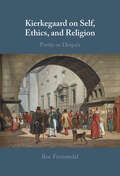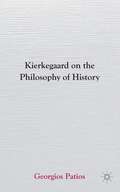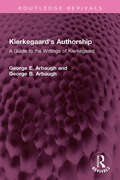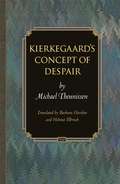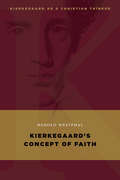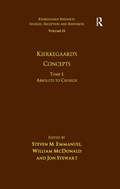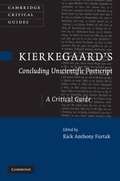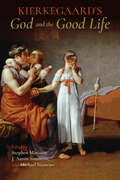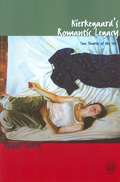- Table View
- List View
Kierkegaard and Mysticism: Reception, Influence, Resonance (Contemporary Theological Explorations in Mysticism)
by Hjördis Becker-LindenthalKierkegaard and Mysticism brings together scholars who show that reading Søren Kierkegaard from the perspective of mysticism not only sheds new light on the Dane’s thought but also offers a fresh approach to mysticism as such, considering its relevance for existential questions, ethics, inter-faith dialogues, and socio-political criticism.The three sections focus on: reception history, considering the mystical writers who, even when mediated through secondary sources, were most formative for Kierkegaard’s thought; mystical concepts such as silence, unio mystica and the relation of the contemplative and active life in various religious traditions; Kierkegaard’s relevance for twentieth-century mystical writers and contemporary spirituality. Whereas previous scholarship has approached Kierkegaard’s relation to mysticism mainly under a negative paradigm, this volume contributes to a greater understanding of the mystical dimensions of his thought. It will be of interest not only to Kierkegaard scholars but also to theologians and philosophers working on mysticism and intellectual history.
Kierkegaard and Nietzsche on the Best Way of Life
by Thomas P. MilesKierkegaard and Nietzsche revive an ancient approach to ethics that evaluates different ways of life considered as a whole. Comparing and contrasting their respective ideals of faith and individual sovereignty, this work reveals a valuable new path for contemporary ethics.
Kierkegaard and Phenomenology (Elements in the Philosophy of S?ren Kierkegaard)
by Kevin HartIs Kierkegaard a phenomenologist? Much depends on what we take 'phenomenology' to mean, since the word has been stretched in all possible directions since Edmund Husserl wrote his major works. What have phenomenologists made of his writings? This question is easier to answer: he has been a constant reference point for many of them, although there is little agreement about his significance. This short book argues that he is a phenomenologist in the context of discovery, not justification. One finds attention to attunements in Kierkegaard, and one also finds modes of bracketing and reduction. Even so, his styles of thinking phenomenologically differ from those of most writers in this philosophical school. His phenomenology takes a theological path, one that leads from 'world' to 'kingdom,' and one that often turns on what he calls 'the moment.'
Kierkegaard and Philosophy: Selected Essays
by Alastair HannayKierkegaard and Philosophy makes many of the most important papers on Kierkegaard available in one place for the first time. These seventeen essays, written over a period of over twenty years, have all been substantially revised or specially prepared for this collection, with a new introduction by the author.In the first part, Alastair Hannay concentrates on Kierkegaard's central philosophical writings, offering closely text-based accounts of the silent concepts Kierkegaard uses. The second part shows the relevance of other thinkers' treatments of shared themes, pointing out where they differ from Kierkegaard. The concluding chapter provides a reason Kierkegaard himself would give for disagreeing with those who claim his texts are infinitely interpretable.Written by the world's foremost Kierkegaard scholar and translator, Kierkegaard and Philosophy is an indispensible resource for all students of Kierkegaard's work.
Kierkegaard and Religion: Personality, Character, And Virtue (Cambridge Studies In Religion, Philosophy And Society )
by Sylvia WalshNo thinker has reflected more deeply on the role of religion in human life than Søren Kierkegaard, who produced in little more than a decade an astonishing number of works devoted to an analysis of the kind of personality, character, and spiritual qualities needed to become an authentic human being or self. <p><p>Understanding religion to consist essentially as an inward, passionate, personal relation to God or the eternal, Kierkegaard depicts the art of living religiously as a self through the creation of a kaleidoscope of poetic figures who exemplify the constituents of selfhood or the lack thereof. The present study seeks to bring Kierkegaard into conversation with contemporary empirical psychology and virtue ethics, highlighting spiritual dimensions of human existence in his thought that are inaccessible to empirical measurement, as well as challenging on religious grounds the claim that he is a virtue ethicist in continuity with the classical and medieval virtue tradition.<p> Explores and clarifies the concepts of personality, character, and virtue in Kierkegaard's thought.<p> Elucidates the dialectic of jest and earnestness, human agency and divine agency, human striving and grace in Kierkegaard's thought.<p> Relates Kierkegaard's concepts of personality, character, and virtue to alternative approaches in contemporary philosophy, theology, and empirical psychology.
Kierkegaard and Spirituality: Accountability as the Meaning of Human Existence (Kierkegaard as a Christian Thinker)
by C. Stephen EvansWe live spiritually when we live in the presence of God.The Danish philosopher Søren Kierkegaard is often read for his contributions to Christian theology, but he also has much to offer about spirituality—both Christian and more generally human. C. Stephen Evans assesses Kierkegaard&’s belief that true spirituality should be seen as accountability: the grateful recognition of our existence as gift. Spirituality takes on a Christian flavor when one recognizes in Jesus Christ the human incarnation of the God who gives us being. In this clearly written and substantive book a leading scholar on Kierkegaard&’s thought makes Kierkegaard&’s contributions to spirituality accessible not only to philosophers and theologians but to pastors, spiritual directors, and lay Christians. The Kierkegaard and Christian Thought series, coedited by C. Stephen Evans and Paul Martens, aims to promote an enriched understanding of nineteenth-century philosopher-theologian Søren Kierkegaard in relation to other key figures in theology and key theological concepts.
Kierkegaard and the Life of Faith: The Aesthetic, the Ethical, and the Religious in Fear and Trembling
by Jeffrey Hanson“A thorough, considered, and provocative treatment of what justifiably remains Kierkegaard’s most famous book.” —Marginalia Review of BooksSoren Kierkegaard’s masterful work Fear and Trembling interrogates the story of Abraham and Isaac, finding there one of the most profound and critical dilemmas in all of religious philosophy. While several commentaries and critical editions exist, Jeffrey Hanson offers a distinctive approach to this crucial text.Hanson gives equal weight to all three of Kierkegaard’s “problems,” dealing with Fear and Trembling as part of the entire corpus of Kierkegaard’s thought and putting all parts into relation with each other. Additionally, he offers a distinctive analysis of the Abraham story and other biblical texts, giving particular attention to questions of poetics, language, and philosophy, especially as each relates to the aesthetic, the ethical, and the religious.Presented in a thoughtful and fresh manner, Hanson’s claims are original and edifying. This new reading of Kierkegaard will stimulate fruitful dialogue on well-traveled philosophical ground.
Kierkegaard and the Paradox of Religious Diversity (Kierkegaard as a Christian Thinker)
by George B. ConnellSøren Kierkegaard (1813–1855) famously critiqued Christendom — especially the religious monoculture of his native Denmark. But what would he make of the dizzying diversity of religious life today? In this book George Connell uses Kierkegaard’s thought to explore pressing questions that contemporary religious diversity poses. Connell unpacks an underlying tension in Kierkegaard, revealing both universalistic and particularistic tendencies in his thought. Kierkegaard’s paradoxical vision of religious diversity, says Connell, allows for both respectful coexistence with people of different faiths and authentic commitment to one’s own faith. Though Kierkegaard lived and wrote in a context very different from ours, this nuanced study shows that his searching reflections on religious faith remain highly relevant in our world today.
Kierkegaard and the Paradox of Religious Diversity (Kierkegaard as a Christian Thinker)
by George B. ConnellSøren Kierkegaard (1813–1855) famously critiqued Christendom — especially the religious monoculture of his native Denmark. But what would he make of the dizzying diversity of religious life today? In this book George Connell uses Kierkegaard&’s thought to explore pressing questions that contemporary religious diversity poses. Connell unpacks an underlying tension in Kierkegaard, revealing both universalistic and particularistic tendencies in his thought. Kierkegaard&’s paradoxical vision of religious diversity, says Connell, allows for both respectful coexistence with people of different faiths and authentic commitment to one&’s own faith. Though Kierkegaard lived and wrote in a context very different from ours, this nuanced study shows that his searching reflections on religious faith remain highly relevant in our world today.
Kierkegaard and the Problem of Self-Love
by John LippittThe problem of whether we should love ourselves – and if so how – has particular resonance within Christian thought and is an important yet underinvestigated theme in the writings of Søren Kierkegaard. In Works of Love, Kierkegaard argues that the friendships and romantic relationships which we typically treasure most are often merely disguised forms of 'selfish' self-love. Yet in this nuanced and subtle account, John Lippitt shows that Kierkegaard also provides valuable resources for responding to the challenge of how we can love ourselves, as well as others. Lippitt relates what it means to love oneself properly to such topics as love of God and neighbour, friendship, romantic love, self-denial and self-sacrifice, trust, hope and forgiveness. The book engages in detail with Works of Love, related Kierkegaard texts and important recent studies, and also addresses a wealth of wider literature in ethics, moral psychology and philosophy of religion.
Kierkegaard and the Rise of Modern Psychology (History And Theory Of Psychology Ser.)
by Sven Hroar KlempeThis book investigates the Danish philosopher Soren Kierkegaard's (1813�1855) contributions to our understanding of psychology. In Kierkegaard's historical context, psychology was challenged from both scientific and philosophical perspectives. Kierkegaard considered psychology a core discipline central to his understanding of metaphysics as well as theology.The first part examines Kierkegaard and experimental psychology, focusing on Kierkegaard's work explicitly referring to psychology. The second part considers psychology in terms of the German Enlightenment, including Kant's rejection of psychology as a science. The third part discusses how to understand Kierkegaard's psychology today, calling attention to his continuing impact on modern psychology and modern science.Kierkegaard's conception of psychology remains relevant for any discussion of the role of today's psychology. In tracing psychology's evolution after Kant and Kierkegaard, the author finds the discipline has followed two main paths. The dominant path follows Kant's ideals about science, while the other, much narrower trail, has its origin in Kierkegaard.
Kierkegaard and the Structure of Imagination: Rethinking Thought Experiments with Kant and Ørsted
by Eleanor HelmsThought experiments play an important role in philosophy and philosophical theorizing. In this book Eleanor Helms examines thought experiments and charts their use in the work of Danish thinkers Hans Christian Orsted (1777–1851) and Soren Kierkegaard (1813–55), arguing that both were influenced by Kant. She demonstrates how key Kantian concepts shape the methods of both thinkers, especially Kant's claim that regulative ideas like the self, God, and nature cannot be directly represented. Kant proposed some ways in which we can make sense of, or 'cognize,' these kinds of abstract ideas, and Ørsted and Kierkegaard take up the practical challenge of realizing Kant's optimism by designing thought experiments to make these big ideas meaningfully accessible to individual thinkers. Helms's book is the first comprehensive study of Kierkegaard's use of thought experiments as a method, and reveals its significance for our contemporary understanding of how thought experiments work.
Kierkegaard and the Theology of the Nineteenth Century
by George PattisonThis study shows how Kierkegaard's mature theological writings reflect his engagement with the wide range of theological positions which he encountered as a student, including German and Danish Romanticism, Hegelianism and the writings of Fichte and Schleiermacher. George Pattison draws on both major and lesser-known works to show the complexity and nuances of Kierkegaard's theological position, which remained closer to Schleiermacher's affirmation of religion as a 'feeling of absolute dependence' than to the Barthian denial of any 'point of contact', with which he is often associated. Pattison also explores ways in which Kierkegaard's theological thought can be related to thinkers such as Heidegger and John Henry Newman, and its continuing relevance to present-day debates about secular faith. His volume will be of great interest to scholars and students of philosophy and theology.
Kierkegaard on Faith and Love
by Sharon KrishekKierkegaard's writings are interspersed with remarkable stories of love, commonly understood as a literary device that illustrates the problematic nature of aesthetic and ethical forms of life, and the contrasting desirability of the life of faith. Sharon Krishek argues that for Kierkegaard the connection between love and faith is far from being merely illustrative. Rather, love and faith have a common structure, and are involved with one another in a way that makes it impossible to love well without faith. Remarkably, this applies to romantic love no less than to neighbourly love. Krishek's original and compelling interpretation of the Works of Love in the light of Kierkegaard's famous analysis of the paradoxicality of faith in Fear and Trembling shows that preferential love, and in particular romantic love, plays a much more important and positive role in his thinking than has usually been assumed.
Kierkegaard on Self, Ethics, and Religion: Purity or Despair
by Roe FremstedalMany of Søren Kierkegaard's most controversial and influential ideas are more relevant than ever to contemporary debates on ethics, philosophy of religion and selfhood. Kierkegaard develops an original argument according to which wholeheartedness requires both moral and religious commitment. In this book, Roe Fremstedal provides a compelling reconstruction of how Kierkegaard develops wholeheartedness in the context of his views on moral psychology, meta-ethics and the ethics of religious belief. He shows that Kierkegaard's influential account of despair, selfhood, ethics and religion belongs to a larger intellectual context in which German philosophers such as Kant and Fichte play crucial roles. Moreover, Fremstedal makes a solid case for the controversial claim that religion supports ethics, instead of contradicting it. His book offers a novel and comprehensive reading of Kierkegaard, drawing on important sources that are little known.
Kierkegaard on the Philosophy of History
by Georgios PatiosHistory doesn't have to mean only an effort to know the past. It can be instead, according to Kierkegaard, a willful and personal choice regarding the creation of the future. Kierkegaard offers us an amazing new approach to the problem of what is history and who makes it.
Kierkegaard's Authorship: A Guide to the Writings of Kierkegaard (Routledge Revivals)
by George E. Arbaugh George B. ArbaughFirst published in English in 1968, Kierkegaard's Authorship begins with a brief account of the life and meaning of Kierkegaard and concludes with the brief treatment of his relation to multifaceted existentialism. By reviewing the total authorship and by making available much of the fruit of widespread research, this work throws into relief Kierkegaard’s central purposes and makes it possible to avoid some of the dubious interpretations which have grown out of more narrowly selective study. This critical introduction and guide is especially important because Kierkegaard’s style was deliberately indirect and distorted and even more because half of the works are actually antagonistic to Kierkegaard’s own views. By the pseudonymous works he intended to lead into truth through a process of frustration, provoking the reader into existence. In another sense, the body of the book is also a biography for, in a degree perhaps without parallel in world history, the library which he created was his deed and life. This is an important read for scholars and researchers of Philosophy specially existentialism.
Kierkegaard's Concept of Despair (Princeton Monographs in Philosophy #49)
by Michael TheunissenThe literature on Kierkegaard is often content to paraphrase. By contrast, Michael Theunissen articulates one of Kierkegaard's central ideas, his theory of despair, in a detailed and comprehensible manner and confronts it with alternatives. Understanding what Kierkegaard wrote on despair is vital not only because it illuminates his thought as a whole, but because his account of despair in The Sickness unto Death is the cornerstone of existentialism. Theunissen's book, published in German in 1993, is widely regarded as the best treatment of the subject in any language. Kierkegaard's Concept of Despair is also one of the few works on Kierkegaard that bridge the gap between the Continental and analytic traditions in philosophy. Theunissen argues that for Kierkegaard, the fundamental characteristic of despair is the desire of the self "not to be what it is." He sorts through the apparently chaotic text of The Sickness unto Death to explain what Kierkegaard meant by the "self," how and why individuals want to flee their selves, and how he believed they could reconnect with their selves. According to Theunissen, Kierkegaard thought that individuals in despair seek to deny their authentic selves to flee particular aspects of their character, their past, or the world, or in order to deny their "mission." In addition to articulating and evaluating Kierkegaard's concept of despair, Theunissen relates Kierkegaard's ideas to those of Heidegger, Sartre, and other twentieth-century philosophers.
Kierkegaard's Concept of Faith (Kierkegaard as a Christian Thinker)
by Merold WestphalIn this book renowned philosopher Merold Westphal unpacks the writings of nineteenth-century thinker Søren Kierkegaard on biblical, Christian faith and its relation to reason.Across five books — Fear and Trembling, Philosophical Fragments, Concluding Unscientific Postscript, Sickness Unto Death, and Practice in Christianity — and three pseudonyms, Kierkegaard sought to articulate a biblical concept of faith by approaching it from a variety of perspectives in relation to one another. Westphal offers a careful textual reading of these major discussions to present an overarching analysis of Kierkegaard’s conception of the true meaning of biblical faith.Though Kierkegaard presents a complex picture of faith through his pseudonyms, Westphal argues that his perspective is a faithful and illuminating one, making claims that are important for philosophy of religion, for theology, and most of all for Christian life as it might be lived by faithful people.
Kierkegaard's Concepts: Absolute to Church (Kierkegaard Research: Sources, Reception and Resources #Vol. 15, Tome 1)
by Jon Stewart William McDonald Steven EmmanuelKierkegaard’s Concepts is a comprehensive, multi-volume survey of the key concepts and categories that inform Kierkegaard’s writings. Each article is a substantial, original piece of scholarship, which discusses the etymology and lexical meaning of the relevant Danish term, traces the development of the concept over the course of the authorship, and explains how it functions in the wider context of Kierkegaard’s thought. Concepts have been selected on the basis of their importance for Kierkegaard’s contributions to philosophy, theology, the social sciences, literature and aesthetics, thereby making this volume an ideal reference work for students and scholars in a wide range of disciplines.
Kierkegaard's Concluding Unscientific Postscript: A Critical Guide
by Rick Anthony FurtakSoren Kierkegaard's Concluding Unscientific Postscript has provoked a lively variety of divergent interpretations for a century and a half. It has been both celebrated and condemned as the chief inspiration for twentieth-century existential thought, as a subversive parody of philosophical argument, as a critique of mass society, as a forerunner of phenomenology and of postmodern relativism, and as an appeal for a renewal of religious commitment. These new essays written by international Kierkegaard scholars offer a plurality of critical approaches to this fundamental text of existential philosophy. They cover hotly debated topics such as the tension between the Socratic-philosophical and the Christian-religious; the identity and personality of Kierkegaard's pseudonym 'Johannes Climacus'; his conceptions of paradoxical faith and of passionate understanding; his relation to his contemporaries and to some of his more distant predecessors; and, last but not least, his pertinence to our present-day concerns.
Kierkegaard's Fear and Trembling
by Daniel ConwayWritten by an international team of contributors, this book offers a fresh set of interpretations of Fear and Trembling, which remains Kierkegaard's most influential and popular book. The chapters provide incisive accounts of the psychological and epistemological presuppositions of Fear and Trembling; of religious experience and the existential dimension of faith; of Kierkegaard's understanding of the relationship between faith and knowledge; of the purported and real conflicts between ethics and religion; of Kierkegaard's interpretation of the value of hope, trust, love and other virtues; of Kierkegaard's debts to German idealism and Protestant theology; and of his seminal contributions to the fields of psychology, existential phenomenology and literary theory. This volume will be of great interest to scholars and upper-level students of Kierkegaard studies, the history of philosophy, theology and religious studies.
Kierkegaard's God and the Good Life
by J. Aaron Simmons Michael Strawser Stephen MinisterKierkegaard's God and the Good Life focuses on faith and love, two central topics in Kierkegaard's writings, to grapple with complex questions at the intersection of religion and ethics. Here, leading scholars reflect on Kierkegaard's understanding of God, the religious life, and what it means to exist ethically. The contributors then shift to psychology, hope, knowledge, and the emotions as they offer critical and constructive readings for contemporary philosophical debates in the philosophy of religion, moral philosophy, and epistemology. Together, they show how Kierkegaard continues to be an important resource for understandings of religious existence, public discourse, social life, and how to live virtuously.
Kierkegaard's Muse: The Mystery of Regine Olsen
by Joakim GarffThe first biography of Kierkegaard's literary muse and one-time fiancée, from the author of the definitive biography of the philosopherKierkegaard's Muse, the first biography of Regine Olsen (1822–1904), the literary inspiration and one-time fiancée of Danish philosopher Søren Kierkegaard, is a moving portrait of a long romantic fever that had momentous literary consequences. Drawing on more than one hundred previously unknown letters by Regine that acclaimed Kierkegaard biographer Joakim Garff discovered by chance, the book tells the story of Kierkegaard and Regine's mysterious relationship more fully and vividly than ever before, shedding new light on her influence on his life and writings.Like Dante's Beatrice, Regine is one of the great muses of literary history. Kierkegaard proposed to her in 1840, but broke off the engagement a year later. After their break, they saw each other strikingly often, inside dimly lit churches, on the streets of Copenhagen, and on the paths along the old city ramparts, passing by without uttering a word.Despite or because of their separation in life, Kierkegaard made Regine his literary life companion, "that single individual" to whom he dedicated all his works. Garff shows how Regine became a poetic presence in the frequent erotic conflicts found throughout Kierkegaard's writings, from the famous "Seducer's Diary" account of their relationship to diary entries made shortly before his death in 1855. In turn, Regine remained preoccupied with Kierkegaard until her own death almost fifty years later, and her newly discovered letters, written to her sister Cornelia, reveal for the first time a woman of flesh and blood.A psychologically acute narrative that is as gripping as a novel, Kierkegaard's Muse is an unforgettable account of a wild, strange, and poignant romance that made an indelible mark on literary history.Some images inside the book are unavailable due to digital copyright restrictions.
Kierkegaard's Romantic Legacy: Two Theories of the Self (Philosophica)
by Anoop GuptaIn Kierkegaard's Romantic Legacy, Anoop Gupta develops an original theory of the self based on Kierkegaard's writings. Gupta proceeds by historical exegesis and considers several important ways of thinking about self outside of the natural sciences. His study moves theories of the self from theology toward sociology, from a God-relationship to a social one, and illustrates how a loss in theological underpinnings partly contributes to the rise in the popularity of cultural relativism. By drawing on Kierkegaard's writings, Gupta develops a metaphysical account of the self that provides an alternative to the idea that there is no such thing as human nature. Keywords: Kierkegaard; Philosophy; Theory of self; Metaphysics; Theology; Sociology
